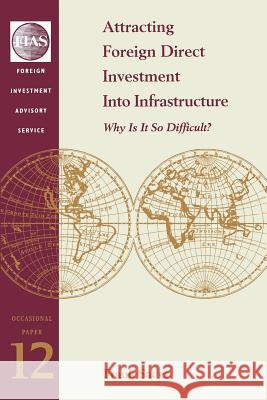Attracting Foreign Direct Investment Into Infrastructure: Why is It So Difficult? » książka
Attracting Foreign Direct Investment Into Infrastructure: Why is It So Difficult?
ISBN-13: 9780821346020 / Angielski / Miękka / 1999 / 169 str.
During the early 1990s, the Foreign Investment Advisory Service (FIAS), a joint facility of the World Bank and the International Finance Corporation (IFC), found that governments and foreign investors alike were concerned and frustrated about difficulties in successfully implementing private infrastructure projects. Governments were trying to attract these new types of investment without having established an appropriate policy framework. Therefore, there were no institutional structures to resolve impediments effectively and provide clear guidelines for the award of such large-scale projects. Legal frameworks tended to address traditional public-sector responsibilities and not investor concerns. Regulatory environments either did not exist or did not provide investors enough guarantees that their future operating environment would be sufficiently reliable. Consequently, FIAS has been advising many governments in the developing world on the best way to establish a policy framework attractive to foreign investors. FIAS typically combines its review of the institutional, legal and regulatory environment with investor roundtables and workshops for senior government officials to ensure that all the major concerns of both the government and the private sector are taken into account. Although each country has unique policy problems, FIAS has encountered common features in key areas that pose stumbling blocks for private infrastructure investments. This study synthesizes this experience and derives lessons for facilitating and encouraging foreign direct investment in infrastructure.











